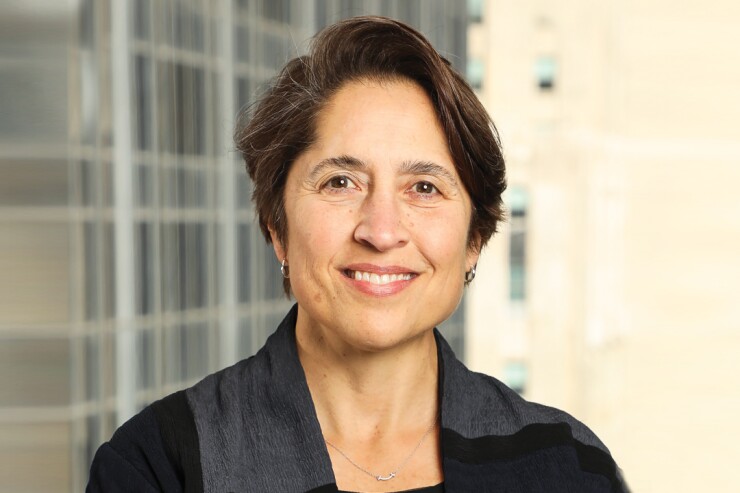
Stacey Friedman, general counsel for
"It's not going to do deep thinking for quite some time," Friedman said of the bank's generative AI tool. "It's not great if you need absolute precision. It's pretty good at summarizing. It's pretty good at finding. It's pretty good at comparing. That's kind of it."
Still, it is part of an
Friedman introduced the large language model AI to about 400 users on JP Morgan Chase's legal team as part of a pilot project that launched in March, and she expects to have all 2,100 members of the team equipped with the tool this year. Data scientists are also working on an app for the legal team that would apply the AI's document comparison function, she said.
Based on monthly feedback from users, the AI does a slightly better job than the bank's previous technology at comparing multiple documents. Overall, the main advantage is that it helps people get into their deeper, analytical work more quickly, Friedman said.
"With something like this, we're going to learn our way into what it does well and doesn't do well. There is such a diversity of jobs, I don't want to assume from the center that I know exactly how it may or may not help people," she said. But providing it to everyone in the department is a priority. "I want to do that as fast as I can."
Apart from technology, Friedman is focused on having a diverse team at
While the diversity representation on the bank's legal team is about the same as that of law schools and better than that of law firms in general, Friedman said, she sees a larger problem for the industry.
Organizations can take two basic steps to remove recruiting and promotion biases that create a lack of workforce and leadership diversity, Friedman said: First, acknowledge that the biases exist. Second, incentivize everyone in the hiring process to present diverse slates of job candidates.
She pointed to a study that showed how law firm partners criticized a legal memo — purportedly written by an attorney with a minority-sounding name — much more harshly than an identical memo purportedly by an attorney with a white-sounding name.
"If you share that with the people who are doing recruiting, it just makes them step back and ask themselves: 'What biases am I bringing to the recruiting process?'" she said.
If everyone in the hiring process can agree that talent is not handed out based on where a person was raised, their background or their race, and if they can also agree that opportunity sometimes is handed out differently, then it sets up an interesting question, she said: "So why isn't it that your talent pool looks like the pool of people in the world that we think have the capability to do this?"
That mindset kicks off an interesting discussion, she said.
"People all of a sudden start recruiting from different parts of the country or maybe law firms that they haven't looked at before," Friedman explained.
"They'll start to build out diverse slates because they ask themselves — when they look at a slate and everybody on the slate looks the same — what is the talent pool I'm missing out on?" she added. "Just by getting that slate together in the right way, we've found that we start to attract the right and more representative workforce. Acknowledging the issue and having diverse slates, those are the two things that pretty much anybody can do. And that will move the dial."
To expand the workforce's LGBTQ+ talent pool, company leaders need to be willing to establish their organizations as places of belonging, but also to talk about the harsh environment in general for LGBTQ+ people. "It's hard to stand up and say: 'Oh, we believe in belonging and inclusion and equity and diversity,' and not acknowledge that it's rough out there, she said."
"There are places in the United States and across the globe where there's just enormous backlash against our community; my community," said Friedman, who identifies as lesbian. "Whether it is the anti-trans legislation that we see in the United States or some of the violence we've seen in other countries — acknowledging that that's happening is important."
Companies should acknowledge that they are places where "the arc is going to bend toward the quality and opportunity" that welcomes everyone's differences and backgrounds.
"Saying those two things is super important for recruiting from my community, because pretending that it isn't rough out there makes people wonder whether you're paying attention," she said.





